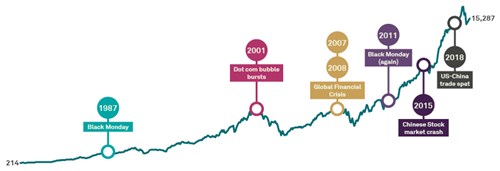
Investing is for the long term
During periods of volatility it’s important to remember that investing is for the long term. Generally the riskier the investment the longer you should be prepared to leave your money untouched, but as a rule of thumb it is a good idea to only invest money that you can leave for at least five years.
Here at Tilney a key part of our investment philosophy is to let time do the heavy lifting for us when it comes to generating investment returns. We base our investment decisions on the fundamentals rather than trying to time the markets or second-guess rises and falls.
Markets have a tendency to rise over time
Over time both stock markets and wider economies have a tendency to rise. This applies to everything from share prices and earnings to wages and the price of household goods.
Of course, there are ups and downs along the way. With long-term investing we can expect cycles – periods of falling prices followed by a recovery. And volatility is actually a sign of a healthy stock market – an unusually calm stock market can be a sign of complacency and problems on the horizon. We believe that a key to successful investing is being comfortable knowing that there will be falls as well as rises in the market.
Is this just a blip?
The below chart looks at the last 40 years of global stock market returns (according to the MSCI World index). We have pointed out a handful of stock market crashes and periods of extreme volatility.
MSCI World index level from 1979 to 2019

Each of these crashes – represented by dips in the line – was unpleasant for investors at the time. And yet, when we look at the big picture we see that the stock market has recovered each time – the index level increased from 214 in January 1979 to 15,287 in January 2019. As the line rises, we see a return to profitability for those who stayed invested for the long term.
But of course, it can be difficult to keep this in perspective with today’s 24-hour newsflow and sensationalist headlines. We also need to bear in mind that past performance isn’t a reliable indicator of future performance.
Sentiment versus fundamentals
We should also consider the reasons behind the recent stock market volatility. Much of this can be attributed to sentiment – in other words, the general outlook and attitude of investors towards a particular country or stock market. The UK and emerging stock markets in particular have suffered from negative sentiment over the past few years – with Brexit uncertainty, the possibility of a Corbyn-led government and the US-China trade spat making investors feel uneasy.
It’s important to bear in mind that changes in sentiment are one of the key drivers of short-term returns. However, short-term changes are impossible to forecast consistently, and trying to time the markets can lead to locking in losses and missing out on gains. This is why at Tilney we ignore market noise. Instead we focus on the fundamentals, particularly earnings growth, valuations and the impact of monetary and fiscal policy. These are the key drivers of long-term returns and they are possible to forecast with a degree of accuracy.
Holding cash
When stock markets are volatile the natural reaction can be to retain or move all of your money into cash. However, it is easy to forget that this comes with its own risks. Inflation can erode the spending power of your cash over the long term as the prices of goods steadily increase. In fact, if you had £1 in 1979 you would only have 20p of spending power in today’s money.
Strategically, however, it is important for charities to retain sufficient cash for short-term needs and projects. At Tilney we use cash flow planning to help charity clients plan their investments and ensure that they have enough cash reserves.
In conclusion
Although markets have been volatile and the future looks uncertain, we see no reason not to be invested in the stock market at the moment. We remain confident that good returns can be found for charities that are comfortable investing for the long-term and riding out the ups and downs along the way.
It’s important to remember that any time spent out of the stock markets is a period of time potentially missing out on returns. As we have seen, these periods of strong performance tend to provide a positive overall return over the long term, even if it’s sometimes a bumpy ride along the way.
No matter what level of investment experience you have, talking to a professional can give you peace of mind that you are doing the right thing. Our experts are always happy to talk, we often find the earlier you start the conversation the more opportunities are available to you. We can talk over the phone or meet you at your workplace or nearest Tilney office – we have offices located throughout the UK. Just speak to your CAF relationship manager or call CAF on 03000 123 444, and ask for Tilney.
All chart data from Lipper for Investment Management, as at 31 January 2019.
The value of your investment can go down as well as up, and you can get back less than you originally invested.
Disclaimer
This article was previously published on Tilney prior to the launch of Evelyn Partners.
